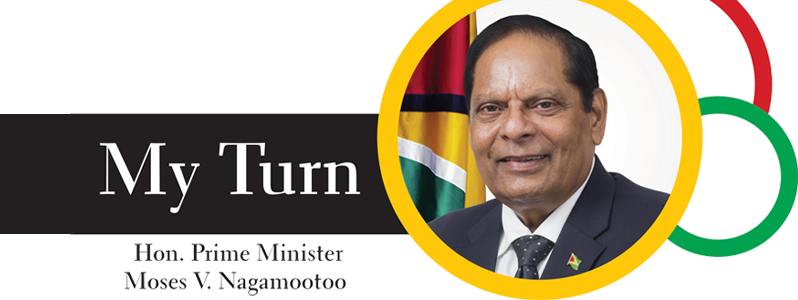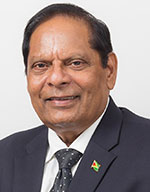ON Tuesday, January 30, an extended Cabinet session was underway when President David Granger handed me a crisp note. My heart pounded with patriotic emotions as I declared that the session would be momentarily interrupted. I then invited the President to announce the “breaking news”.
At the announcement, spontaneous applause reverberated inside the Cabinet room. For a moment it seemed that the entire, united Guyanese nation was in the august chamber, celebrating the decision by UN Secretary-General, Antonio Guterres. That decision refers to the International Court of Justice, the legal contention raised by Venezuela over the validity of the arbitral award on the territorial boundary between Guyana and the Bolivarian Republic of Venezuela.
LONG, HARD BATTLE
Guyana has fought a long, hard and costly battle for a juridical resolution of the  controversy, and the UN decision came as a vindication of the consistent and strenuous national efforts, particularly since the APNU+AFC Coalition came to office. We stood within the law, even when we took blows from the bigger, more powerful and aggressive neighbour. We suffered enormous damage to our economy and loss of investment opportunities. But the law has been and remains Guyana’s sword and shield!
controversy, and the UN decision came as a vindication of the consistent and strenuous national efforts, particularly since the APNU+AFC Coalition came to office. We stood within the law, even when we took blows from the bigger, more powerful and aggressive neighbour. We suffered enormous damage to our economy and loss of investment opportunities. But the law has been and remains Guyana’s sword and shield!
In the coming days and weeks, the Ministry of Foreign Affairs is expected to highlight the significance of the UN decision as part of nationwide civic education. Every child needs to know that the only just and lasting settlement of the controversy must flow from legal processes, and that the World Court is the guarantor of these processes.
BEST WAY FORWARD
Enlightened and seasoned diplomats have hailed the decision as the best forward move in what has been a stale and stagnated row that has troubled relations between two peaceful peoples on the shoulder of South America. But, the Venezuelan ruling clique, didn’t think so. It rejects the path to settlement under international law, of its own legal fiction.
The world is watching and it knows that in spite of the expected political bombast and braggadocio, the present Venezuelan regime, or a future government, cannot wish away the jurisdiction of the ICJ, nor can it trifle with its persuasive and authoritative rulings — whether as opinions or advisories.
The World Court or ICJ, is the major judicial branch of the United Nations. The judges are elected by the powerful Security Council and the General Assembly of the United Nations. A full bench consists of 15 judges who represent the major power blocs and various nationalities. Our own Guyana-born former Attorney-General, Dr. Mohamed Shahabuddeen, has been a distinguished judge of the International Court of Justice (1988-1997), which routinely upholds the inviolability and sanctity of treaties.
TREATY OF WASHINGTON
February 2 marked the 121st anniversary of the Treaty of Washington, under which the United Kingdom and Venezuela agreed to submit to arbitration, questions regarding the boundaries of then British Guiana and the United States of Venezuela. The first Article of the Treaty provides that an Arbitral Tribunal “shall be immediately appointed to determine the boundary-line between the Colony of British Guiana and the United States of Venezuela”.
Article V states that all questions considered by the tribunal, including the final decision, shall be determined by a majority of all the arbitrators, whilst Article XIII provides for consideration of “the result of the proceeds of the Tribunal of Arbitration as a full, perfect, and final settlement of all the questions referred to the Arbitrators”.
COUNTRY FIRST
On September 24, 2017 in my column “Country First”, I reminded that October 3 last marked the 118 years of the Tribunal Award on the boundary between Guyana and Venezuela. The Award, as provided for by the 1897 Treaty, is binding “as a full, perfect and final settlement”.
In his address at the United Nations on September 20 last, President Granger reminded the world that Venezuela has claimed two-thirds of Guyana’s territory. Later, Foreign Affairs Minister, Vice-President Carl Greenidge, explained at a UN Social Media platform that there is no other case in the world where one country claims two-thirds of another country.
In spite of that baseless claim, many Venezuelans seek refuge in Guyana, as they do in Colombia, most in search of food and work. They seem unmindful that their leaders are ungrateful to the good Samaritan, and embrace Guyana as a peaceful, helpful and friendly neighbour.
For those observing the skirmish in furtherance of a false claim, which has been stoked for close to 60 years, it is clear that the Venezuelan people cannot carry the burden of a past, mistaken contention that an international treaty is flawed. They too, like all Guyanese, must be free to realise their dreams within their rich (or potentially so) secured land-space, not borders that exist as a figment of a greedy imagination.
ROAD TO THE HAGUE
President Granger underlined the fatal effect of that imagination on access by Guyana not only to the sea, but entitlement to our fishing, and oil-and-gas potentials. He told the world: “We depend on our territorial and maritime resources for development and for the release of our people from poverty.”
The decision by the UN Secretary-General has opened a fresh new window through which we could re-assert Guyana’s sovereignty over our territory – all of it. We should, as I have repeatedly urged, put “Country First” and let our collective, patriotic heart beat and live for our beloved Guyana. We cannot be divided over our common duty to our Motherland.
As President Granger recently retorted, “We cannot sell out. We cannot give away. We cannot offer the adversary any corridor or any passage.”
The road to a peaceful, lawful settlement leads to The Hague!





.jpg)








